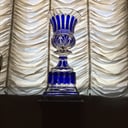Pindar was a famous Greek figure in what field?
Pindar (born probably 518 BC, Cynoscephalae, Boeotia, Greece—died after 446, probably c. 438, Argos) was the greatest lyric poet of ancient Greece and the master of epinicia, choral odes celebrating victories achieved in the Pythian, Olympic, Isthmian, and Nemean games.
Pindar was of noble birth, possibly belonging to a Spartan family, the Aegeids, though the evidence for this is inconclusive.
Pindar’s poetry borrowed certain fundamental characteristics from the cultural traditions of his native Boeotia, a region that remained rather at the margins of political and economic trends of the Archaic (c. 650–480) and Classical (c. 450–323) periods.
The ancient biographical tradition reports that as a young man Pindar went to Athens to complete and refine his poetic education. It is unclear whether he studied there with Lasus of Hermione, who had introduced important innovations into the dithyramb, or whether he learned from him at second hand. At any rate, in 497 or 496 Pindar, scarcely more than 20 years of age, won first place in the dithyrambic competition at the Great Dionysia, an event that had been introduced in 508.
More Info:
www.britannica.com

